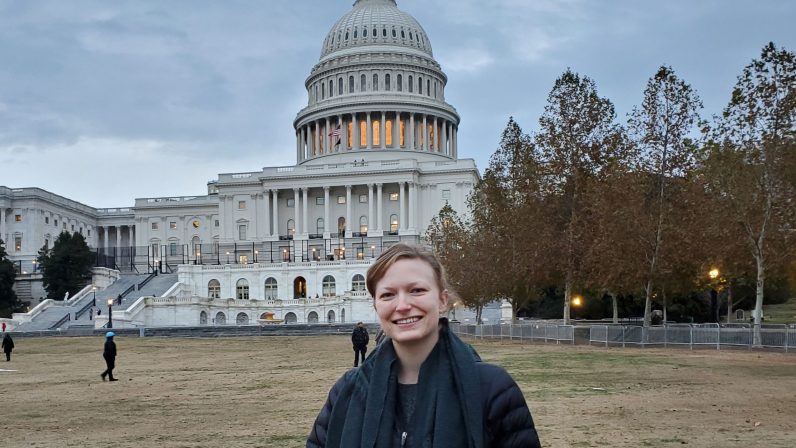It’s Earth Day, a day I renew my commitment to serving Planet Earth. I’me realizing more and more that the most significant way I can be of help is to keep working with the upcoming generations who will assume stewardship of our planet. Today’s blog is about one of those young stewards.
One of my most favorite things about being at the Seed for 45 years is catching up with the adult version of one of our former students from time to time. It happened recently when I had a chance to sit down with Leila Duman, 30, who attended the Seed from the time she was three, through fifth grade. After her graduation from the Seed, Leila attended Arizona School for the Arts, Bard College, and the University of Maryland, where she earned a PhD in Chemistry. She is living in Washington, D. C. and is currently in a science policy fellowship program through The American Chemical Society, which places PhDs in congressional offices as technical advisors on policy issues.
I asked Leila what brought her to the position she holds today. She talked about her early years at the Seed and ASA, how she felt a sense of openness in both schools to explore her interests. Leila said she didn’t feel locked in, and gained confidence to try new things. Specific to the Seed, she remembered projects, when they could explore interests, be creative, and look for solutions and alternative ideas. She also recalled the Seed’s emphasis on kindness, inclusion, and the theme, “hurt no living thing.” This experience taught her that it’s okay to be an individual and have your own ideas. Leila learned that her ideas were valuable, and what she and her friends thought about mattered. Speaking of friends, Leila happily stated that many of her Seed peers remain some of her best friends 27 years later.
Leila said she never thought she’d be destined for science, and was drawn into it because of an interest in how the world works. She talked about how challenging chemistry was for her, and mentioned that her great professors, love of research, and highly competent advisors kept her engaged. In grad school what kept her interested was learning ways that science could be used to make people’s lives better, particularly using information to make policy.
Toward the end of our conversation I asked Leila what gives her hope and keeps her going. Here is her response: “I know there are plenty of problems, but being a scientist, I know people are working hard to solve them. We just can’t forget that we are where we are for a reason. For instance, we need energy to power things but we’re eventually going to figure out how to create it more sustainably. People are always trying to do good things and do what is helpful.” As I walked away from my time with Leila, I felt proud of her and the wonderful young woman she’s become. I felt inspired by her mind and commitment to science as a path for making our world a better place. It gives me hope to think of her walking through the U. S. Capitol every day, enroute to her work. Planet Earth is in good hands with people like Leila, and I’m honored to have been a part of her journey.

